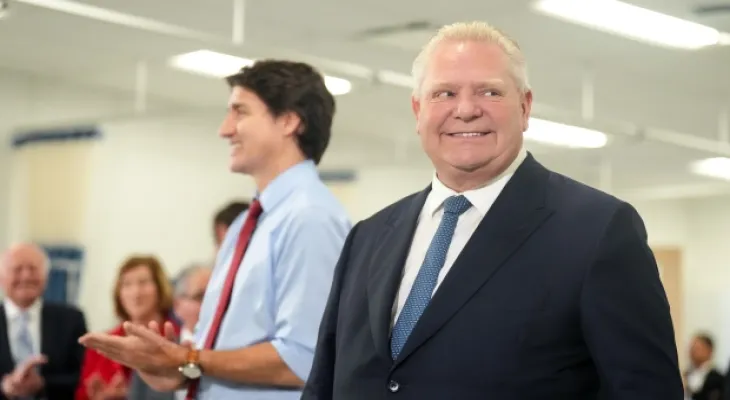Search here
Newspaper
Search here

Arab Canada News
News

Published: February 10, 2024
Ontario Premier Doug Ford signed a $3.1 billion healthcare deal with the federal government to increase access to primary care and reduce wait times.
Prime Minister Justin Trudeau announced the agreement late Friday morning, making Ontario the fifth province to reach a deal with Ottawa for its share of a $200 billion health agreement.
Other provinces that have made agreements include British Columbia, Prince Edward Island, Alberta, and Nova Scotia.
This announcement comes nearly a year after the two governments reached a 10-year deal in principle to fund healthcare costs in Ontario, with an additional $46 billion to finance the Canada Health Transfer program.
Premiers are requesting that the federal government increase their annual health transfers to cover 35 percent of their health budgets, up from 22 percent.
This kind of increase would reach about $28 billion annually, with an additional 5 percent annually thereafter.
About a year ago, Ottawa said its bilateral agreement with Ontario includes $8.4 billion and a one-time additional amount of $776 million to meet "urgent needs" in children's hospitals and emergency rooms.
As part of the deal, provinces had to agree to expand access to family health services, support health workers and reduce backlogs, increase support for mental health and substance use, and update their healthcare systems to include digital tools.
Department officials confirmed that the $3.1 billion pledged on Friday covers the first three years of this agreement.
Trudeau told reporters: "For generations, publicly available healthcare has been an essential part of what it means to be Canadian." "It is built on a promise that, regardless of where you live or what you earn, you will always be able to get the medical care you need."
Under the agreement, Ontario committed to adding hundreds of new family doctors and nurse practitioners, as well as thousands of nurses and personal support workers to address staff shortages, and funding will also be used to remove barriers for internationally trained doctors, add five new youth health centers, and address gaps in Indigenous healthcare services.
Ford described the agreement as "historic," saying it’s about advancing priorities regardless of political affiliations and will help fund targeted programs.
He said: "This new funding will enhance the important work we are doing in Ontario."
"While we are pleased with the progress we have made, we know there is more work to be done. That is why today’s agreement is so important to strengthen our healthcare system; more resources are needed, as the medical association says."
The Ontario Medical Association said that while the funding announcement is welcome and has the potential to help with urgent issues, it is not enough to address the "major structural challenges" within the healthcare system.
OMA President Dr. Andrew Park said in a statement: "While we address the most pressing issues, we also need to ensure we have a stable, long-term funding formula to fix the system’s underlying problems and build for the future, knowing we have an aging population and patients with more medically complex needs."
OMA has been sounding the alarm for years, warning that 2.3 million people in Ontario do not have a family doctor.
The Ontario Hospital Workers’ Union Council affiliated with CUPE said last month that a survey showed two out of five workers in the province have thought about leaving their jobs and a similar number fear going to work due to staff shortages.
Comments